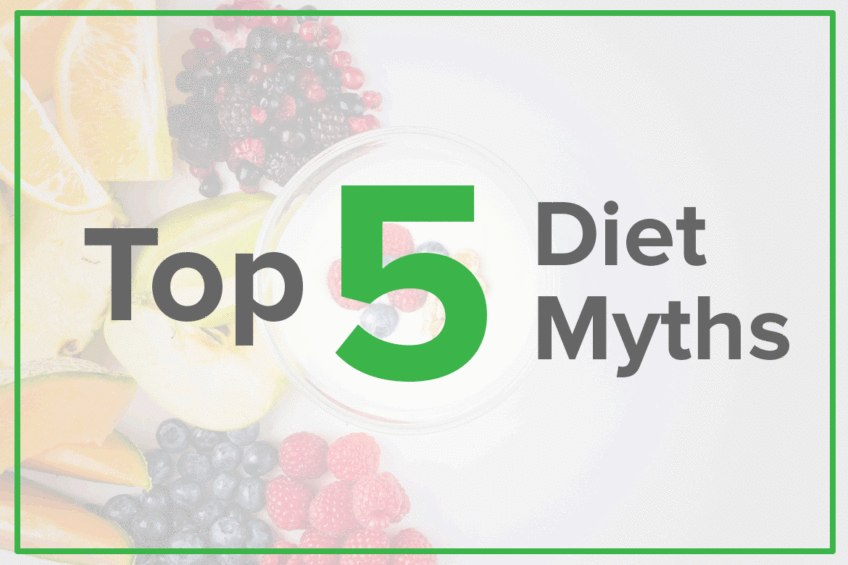Top 5 Diet Myths: Reviewed by a Dietitian
Is anyone else completely and utterly confused with the sheer amount of do’s and don’ts when it comes to nutrition? In a society that is driven by a diet culture and mentality, it has become increasingly difficult to navigate the murky waters of health. We would suggest that while we often know better, many of us are still looking for a quick fix that will deliver happiness in the form of size xx jeans. While dieting and motivation for dieting is a very complex topic (which requires a blog all on it’s own), here are the top five diet myths that we have seen many people succumb to.
Myth 1: Carbs are bad.
Arguably the greatest trend in the diet world right now is low-carbohydrate, high-protein style eating patterns. While low carb diets are nothing new (think back to Atkins, Paleo and now Keto), there seems to be an incorrect perception that carbohydrates are solely responsible for weight gain. First off, it is vital to know that our brain and other vital organs preferred fuel source is carbohydrates. While we do encourage the consumption of complex carbohydrates (whole grains, whole fruits and vegetables), all carbohydrates need to be broken down to simple sugar (glucose) to be used for energy by our cells. While weight loss is a common result of restricting carbohydrates, an equally as common outcome is the loss of muscle mass as the body will often move to protein stores as an alternate form of energy. Additionally, low carb diets are often not sustainable due to their restrictive nature and weight regain (often above baseline weight) is extremely common. Ultimately, it comes down to balance and portion size.
Myth 2: Less is more.
Restriction. The golden rule of most diet programs. While it is true that we need a calorie deficit to facilitate weight loss, many diet programs restrict calories to dangerously low levels. Many people will experience extremely rapid weight loss; however, when sustained and repeated in the long term, there can be extensive damage done to your body’s metabolism. Every individual has a set metabolic rate that their body requires to live, and most diet programs will set calorie targets below this level; essentially tricking your body into thinking there is a famine. For many people who have been prone to under fueling, it will often take much more time and an increase in calories to see change to body weight/composition.
Myth 3: Cheat days keep me happy.
This one may come as a bit of a surprise. Why would we mention cheat days? Can’t we have a day of guilt-free-all-you-can-eat-ice-cream-and-burgers? What we would challenge you to check-in with is the mentality that “cheat days” foster. Do you feel guilty/shameful after your cheat day? What are your thoughts and feelings toward yourself after a cheat day? Do you deem foods as “good” and “bad” based on cheat days?
We would argue that rather than having days to go crazy, we need to learn how treats and extras fit into our week and build healthier relationships with those foods and ourselves, rather than fostering a good vs. bad mentality.
Myth 4: 30 days will solve my weight woes
Anything that sounds too good to be true, usually is. Healthy eating and maintaining a healthy body composition is a life-long journey not a 30-day project. We think the quick fix nature of diets appeal to us. We are all people who like things done quickly with as minimal effort as possible. It’s simply human nature. It is all too common to see success for an individual who is following a strict program for a short time frame, only to have all the progress lost a few months after stopping. Quick fixes will provide quick solutions that also quickly disappear.
May 5: Supplements are the answer.
Many diet programs will also offer differing supplements that are required or strongly advised. This could be due to the low-calorie level of the diet requiring supplements for critical organ functions or simply for the company to boost sales. In reality, with the exception of Vitamin D, a balanced diet can truly provide us with all of the nutrients we require for health. In fact, there have been dire health concerns documented for individuals who overdo vitamin, mineral and other natural health supplements as the liver struggles to process and clear out all of the excess nutrients entering the body. Working with a registered dietitian is vital to ensure that what are you taking is healthful and necessary.
Keep in mind diets can be disguised as many different things. Ask yourself some of these questions before making the decision to sign up for your next cleanse or 30-day challenge and look for professional advice when you need it!

